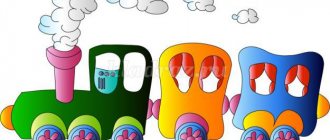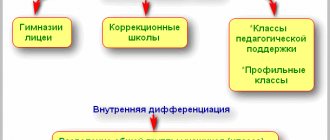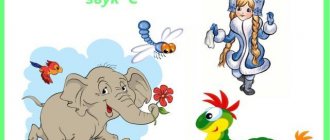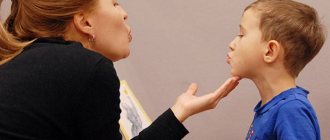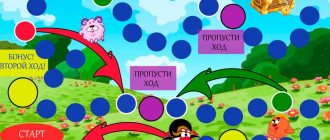Speech therapist's lesson on differentiating sounds [P] - [B]
Topic: Overcoming acoustic dysgraphia (differentiation of sounds [p] - [b]) in 1st grade students.
Goals:
Correctional and educational:
- distinguishing sounds [b – p] by ear and in pronunciation;
- clarification of the differences between paired voiced and voiceless [b – p];
- strengthening the correlation of the unvoiced sound [p] with the letter P, and the voiced sound [b] with the letter B.
Correctional and developmental:
- development of phonemic processes;
- development of attention, memory, observation, activity;
- development of fine motor skills;
- development of spatial orientation;
- development of general motor skills (synchronization of movement with speech).
Correctional and educational:
- developing the skill of mutual checking;
- nurturing the desire to achieve a goal.
Equipment: rebus picture, subject pictures (rooster, saw, squirrel, pepper, butterfly, train, ram, parrot), cards with words with a missing letter, notebooks, pens, pencils.
Progress of the lesson
I. Organizational moment.
— Greeting: “Guys, say hello to each other. Now let your fingers say hello” (kinesiological exercise “Fingers say hello”: move your fingers one by one, connecting them into a ring with your thumb. The test is performed in forward and reverse order. At the beginning, the exercise is performed with each hand separately, and then together).
II. The main part of the lesson.
1. Report the topic of the lesson.
Guys, please guess my riddles. They made it out of boards and put on a belt. And these dishes store the summer collected from the garden. (barrel) On the branches - A dense lump. A green leaf sleeps in it. (bud)
Guys, have you guessed what this is? That's right, it's a barrel and a kidney! What sounds do these words differ in?
“Guys, find the letters B and P in the picture. Well done!”
“So today we’ll talk about the letters B and P and the sounds they represent.”
1. Clarification and comparison of articulation and pronunciation of sounds P-B.
Pronounce the sounds [b] and [p]. Now I’ll pronounce it, and you look, is the position of the lips the same when pronouncing these sounds? (With lips. Lips close).
- Put your hand on your throat and listen to whether it trembles when you pronounce the sound [b]. B-B-B. (Trembles).
Is this sound pronounced with or without a voice? (With voice). - Now pronounce the sound [p] and listen to whether your throat trembles when pronouncing it. (Does not tremble). Conclusion: that [b] is a voiced sound, and [p] is unvoiced.”
2. Exercises to develop phonemic awareness.
Repeat the words in pairs (each child repeats his pair): bass - pas byl - dust bang - fluff pain - Paul bar - steam beat - drink bot - sweat sides - while white - sang flea - bowl bathhouse - Panya fence - constipation shine - splash master - guy board - port
“Catch the sound [p] or sound [b]”:
- “Guys, you should clap your hands if you hear the sound [p] ([b]). Listen carefully!" (button, dress, butterfly, lamp, shelf, paper, finger, luggage, album, crowd, dog, ballet, ballet, shovel, shirt, fur coat, stick, barrel, kidney, sail, trap, drum).
The letter got lost. Replace the voiced [b] with the voiceless [p] and vice versa, the voiceless [p] with the voiced [b]. Stick, kidney, sing, beam, fight, barrel, story, punk, dust, shine, punk, splash, bank, fence, steam, constipation, bar, space, sang.
Selection of pictures whose names contain the sounds [b - p]: - “Each of you has pictures on your desk. Arrange them into 2 groups. Place pictures on the right with the sound [p] in their names, and on the left with the sound [b].”
3. Physical education (actions according to the text).
In the morning the rooster stood up on his paws and got ready to exercise. He turned left, right, and did the squats correctly. I cleaned the fluff with my beak And again at my desk - plop!
4. Differentiation of sounds [b – p] in writing.
Help the letters [b – p] fall into place:
_auk, zu_y, _ukva, shlya_a, sa_ogi, ru_ashka.
- “Guys, look at the words, each of them has lost one letter. Help them find each their own letter. In your notebook, write down words with the letter P in one column, and words with the letter B in another column.” - “Underline the letters B and P with a pencil.” - “Exchange notebooks and check each other whether you wrote correctly.”
Ophthalmic pause (electronic ophthalmic pause “Clouds”, developed by O. I. Mishukova): “Guys, now I’ll turn on the picture. You will need to follow the cloud with your eyes.” “Tell me, what sound is in the word cloud - [b] or [p]?” “Where is it located: at the beginning, middle or end of the word?”
Write down the letter you hear:
- “I will read a sentence to you, and you write down in your notebook the letter that is most often heard in it: B or P.” Fishermen were fishing. The fields are watered by tulips. The ship is sailing smoothly. There are butterflies on a blue flower.
III. Summing up the lesson
- “Guys, what sounds and letters did we work with today? How do they differ? Well done! Everyone worked hard today, I liked your work in class!”
Author of the material: Menshikova Marina Aleksandrovna
Also on topic:
Presentation “P–B differentiation in words and sentences”
Notes of speech therapy classes.
III. Summing up the lesson.
Progress of the lesson.
I. Organizational moment.
Psycho-gymnastics. -Guys, good morning! A new wonderful day has arrived. Now I will smile at you, and you will smile at me and smile at each other. It's so good that we are here with you today. We are calm and kind, we are friendly and affectionate! We are all healthy! Please take a deep breath through your nose. Imagine that you are breathing in the freshness, kindness, and beauty of today! Now exhale. Inhale again and exhale. And the last time, inhale and exhale. Well done! Let's smile at each other again and begin our lesson. - Guys, what date is today? What month? What about the time of year? Why did you decide so? What time of day? Let's write today's date in our notebook.
II. Main part.
1.Message about the topic of the lesson.
-Guys, please guess my riddles.
They made it out of boards and put on a belt. And these dishes store the summer collected from the garden. (barrel)
On the branches - a dense lump. A green leaf sleeps in it. (bud)
- Guys, did you guess what it is? That's right, it's a barrel and a kidney! -What sounds differ between these words? -What sounds are these? (consonants, hard, paired according to deafness - voicedness.). -Let's compare the pronunciation of the sound [b] and the sound [p], what are the similarities and differences in the pronunciation of these sounds (control of the articulation of isolated sounds).
-The following riddles:
We always walk together, looking alike like brothers. We are under the table at dinner, and under the bed at night. (boots)
In winter it doesn’t get warmer, in summer it doesn’t get colder. (cellar)
-Name the first letters in these words.
2. -Guys, now I will list you the fairy-tale characters, and you listen carefully and remember what fairy tale they are from. Pinocchio, Karabas-Barabas, dad Carlo, cat Basilio, Giuseppe. What is this fairy tale? (these are characters from the fairy tale “The Golden Key, or the Adventure of Pinocchio.” Attention is focused on the fact that all the names of fairy-tale characters contain the sounds [b] and [p]). -And now you have this task: please list the fairy tales whose names contain the sounds [b] and [p]. (gingerbread man, turnip, Ryaba chicken, Bremen musicians, bluebeard, swineherd, princess and the pea, Aladdin's magic lamp, Ali Baba and the forty thieves, Elena the Beautiful, etc.) -Where are our sounds in these words? -Guys, now please list the fairy-tale characters whose names contain the sounds [b] and [p]. (Cheburashka, Baba Yaga, Troubadour, Winnie the Pooh, Barmaley, Aibolit, Turtilla Tartilla, Piglet Chok, etc.) -And where are the sounds [b] and [p] in these words? -And in which fairy tale do we meet such characters: Yagupop, Abazh? ( Kingdom of Crooked Mirrors). -What letters in writing represent the sounds [b – p]? (letters “b – p”). -Let's write down some of these words in a notebook in two columns: in the first, words with the sound [b], in the second, words with the sound [p].
| [b] | [P] |
| Kolobok | Princess |
| Barmaley | Swineherd |
| Pinocchio | Winnie the Pooh |
| Cheburashka | Pig Chock |
| Troubadour | Elena the beautiful |
-Please, guys, underline the letter “p” with one line, and the letter “b” with two lines.
3. Physical exercise.
Imitation of the movements of various fairy-tale characters. (How Kolobok rolls. How Pinocchio sticks his long nose everywhere. How the princess walks. How Winnie the Pooh climbs a tree for honey. etc.)
4. Games with sounds [b – p]. “Catch the sound [p] or sound [b]”
-Guys, you should clap your hands once if you hear the sound [p] and twice if you hear the sound [b].
Listen carefully! (lamp, shelf, paper, finger, luggage, album, crowd, dog, ballet, ballet, shovel, fur coat, stick, barrel, kidney, sail, trap, drum, etc.) “Digital series”
- And now you count how many [b] sounds there are in words and raise the corresponding number (1 or 2).
(battle, balalaika, beavers, bomb, blizzard, barberry, armor, drummer, etc.) -Now count the sound [p] in the words and raise the corresponding number. (dad, ensign, saw, Panama, baby, attempt, trap, slippers, etc.) Vocabulary dictation with sounds [b - p].
-Write in three columns: in the first - only with the sound [p], in the second - only with the sound [b], and in the third - with the sounds [b - p].
Underline P with one line, B with two lines. (seal, pirate, sample, lamp, letter, sausage, clouds, clearing, threshold, ram, deck, steamship, barge, fence, bus, cathedral, shelf, marriage, package, parting, device, etc.) Syllabic mosaic
-Now I will give you cards, the syllables “pa” or “ba” are missing in them.
You need to insert these syllables correctly and write down the resulting words. (ry__, tru__, tro__, Liu__, __ran, __latka, __lets, lo__ta, pri__vil, za__va, __gazh, __nan, __rta, __latka, ry__lka, etc.) The letter got lost.
-Replace the voiced [b] with the voiceless [p] and vice versa, the voiceless [p] with the voiced [b]. (stick, kidney, sing, beam, fight, barrel, tale, punk, bank, dust, shine, punk, splash, bank, fence, steam, constipation, bar, space, sang)
III. Summarizing.
-What sounds did we repeat today? -What sounds are used to indicate them when writing? -How are they similar? How are they different? Assessment of children's activities.
Homework.
- Guys, now please write down your homework. Come up with and write down in your notebook the names of birds and animals that contain the sounds [b - p]. Underline “p” with one line, “b” with two lines. (panda, hippopotamus, dog, rooster, sparrow, pigeon, badger, squirrel, parrot, ram, leopard, monkey, etc.)
References: 1. Gaidina L.I., Obukhova L.A. Speech therapy exercises. 1-4 grades. M., 2007. 2. Eletskaya O.V., Gorbachevskaya N.Yu. Organization of speech therapy work at school. M., 2007. 3. Elkina N.V., Tarabarina T.I. 1000 riddles. Yaroslavl, 2002. 4.Efimenkova L.N., Misarenko G.G., Organization and methods of correctional work of a speech therapist at a school speech center. M., 1996. 5. Illarionova Yu.G. Teach children to solve riddles. M., 1985. 6. Lalaeva R.I., Venediktova L.V. Differential diagnosis and correction of reading and writing disorders in primary schoolchildren. SSPb., 1997. 7. Pozhilenko E.A. A magical world of sounds and words. St. Petersburg, 2008.
Good luck!
